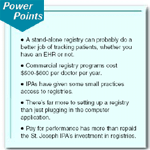Article
Do disease registries = $$ rewards?
Online patient tracking tools can help you score bonuses from insurers. We looked at some practices—small and large—that are using them.

But what registries really excel at is reminding physicians which of their patients need what and enabling them to reach out to patients who don't seek the care they need. True, many electronic health record systems also provide guideline-driven reminders during patient visits. But few EHRs include registries, which enable you to actively manage your patient lists so that needed services don't slip through the cracks. Hence a stand-alone registry can probably help you do a better job, whether or not you have an EHR.
Besides demographic information, a registry includes patient-specific clinical data, such as lab results and medications, for use at the point of care. A registry can prompt physicians or other caregivers to provide needed care. It can also be used between visits to identify patients with gaps in care, so that staffers can contact those patients and have them come in for visits and/or tests.
It's not that registries are expensive. Some software created or offered by Medicare quality improvement organizations is actually free. Commercial registry programs cost around $500 to $600 per doctor per year-much less than license fees for most EHR programs. (For more information, see Metzger's report and another one that reviews registry products at http://www.chcf.org)
But there's far more to setting up a registry than just plugging in the computer application. For example, unless you want to have your staff transfer basic patient information by hand, you'll need an interface with your practice management system. You'll also need online lab results, especially for a diabetes registry. And, assuming you don't have an EHR, it will take your staff time to put other key data in the registry.
IPAs have made it easier for some small practices to set up registries. These networks spread the cost and, in some cases, have gotten labs, hospitals, and health plans to provide data that physicians don't have in electronic form or don't have at all. The Central Jersey Physician Network, for instance, persuaded local employers to lean on reference labs to supply online lab results, says Metzger.
Some medium-sized groups have created their own registries. Four years ago, the Family Practice Medical Center of Willmar, MN, an eight-doctor group, built a homegrown diabetes registry using Microsoft Access and started entering data manually. Recently, the group began using a NextGen EHR that includes a registry function; but the physicians have already benefited from having clinical snapshots of their diabetes patients, says FP Michael D. Morris.
"Physicians got a printout of all the diabetic patients they manage, and it included a number of core indicators: their HbA1c and LDL cholesterol values, whether they'd had eye exams, their blood pressure-all the different parameters. So you could look at that and say, 'Boy, I'm cooking,' or 'Oh, there's an outlier, we better call him in for a visit.' That's really quite helpful."
Here are the experiences of some other groups and IPAs that use registries. While your practice situation may differ from theirs, bear in mind that the principles of registries are the same in every practice setting.





